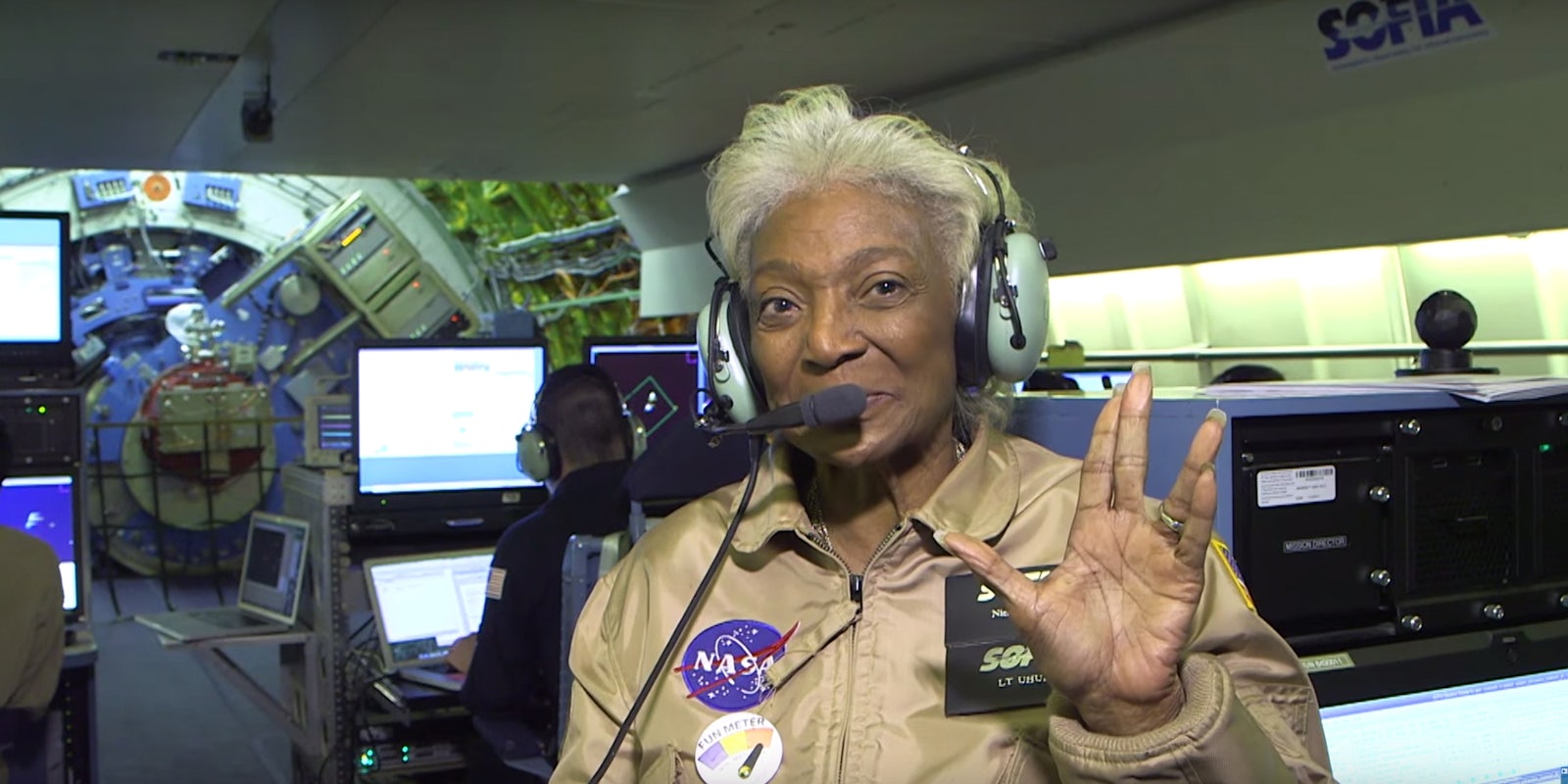By the 23rd century, the world that Star Trek inhibited was one of peace and exploration that was centuries in the making, but it ended up inspiring the astronauts and scientists who may help one day to make Stark Trek a reality.
In honor of Star Trek’s 50th anniversary, space agencies and those who work for them are paying homage to the show that showed exploring the Final Frontier was possible.
“Space, the final frontier…” #StarTrek50 today – thanks @startrek for inspiring us #LLAP50 #spaceforinspiration pic.twitter.com/t6tg8Ql4rX
— European Space Agency (@esa) September 8, 2016
From all of us at NASA, we wish the entire Star Trek family a happy #StarTrek50! Thanks for the inspiration! pic.twitter.com/VUl4VefWuM
— NASA (@NASA) September 8, 2016
Honoring #StarTrek50 today. ’cause if we want to build the future, we first need to have the boldness to imagine it! https://t.co/GWkfNgaOjr
— Samantha Cristoforetti (@AstroSamantha) September 8, 2016
Thanks @StarTrek for the inspiration & possibilities. I hope @NASA & around the world we’re building the future you envisioned. #StarTrek50
— Bobak Ferdowsi (@tweetsoutloud) September 8, 2016
Happy anniversary, @StarTrek! Thank you for inspiring my @NASA peers and fellow astronauts https://t.co/PSxWi71Mo9 #StarTrek50
— Mike Massimino (@Astro_Mike) September 8, 2016
To boldly go: How Star Trek inspired @NASA‘s planet hunters: https://t.co/EpMi9goltU #StarTrek @PlanetQuest pic.twitter.com/DjM8fnLztK
— NASA JPL (@NASAJPL) September 8, 2016
It’s written in the stars… or a star forming region. For #StarTrek50, we present the ‘Enterprise’ Nebulae. pic.twitter.com/Bd4IbVfgep
— NASA (@NASA) September 8, 2016
#TBT We hosted the Star Trek crew in 1976 for the rollout of Space Shuttle Enterprise. #StarTrek50 pic.twitter.com/20vDzlMsKf
— NASA Armstrong (@NASAArmstrong) September 8, 2016
#Today we celebrate 50 years of @StarTrek inspiring space geeks everywhere, like the crew of STS-54. #StarTrek50 pic.twitter.com/E86cx2g13n
— NASA History Office (@NASAhistory) September 8, 2016
To mark the occasion, NASA replaced the International Space Station icon with the U.S.S. Enterprise as Mission Control tracks its location around the globe.
In honor of #StarTrek50, an Enterprise icon is used to show where station is on the world map in Mission Control! pic.twitter.com/HF6H6rM3nm
— International Space Station (@Space_Station) September 8, 2016
NASA and Star Trek have been intricately linked since the latter’s inception, and the cast is still astounded with what has been accomplished in space exploration.
“All these imaginative exercises in science fiction is merely food for the imagination of scientists who are actually working with technology that is,” William Shatner said.
#StarTrek50 is today! @WilliamShatner, @NichelleIsUhura & @GeorgeTakei share their passion for space exploration. pic.twitter.com/vYDVctzi57
— NASA (@NASA) September 8, 2016
The space agency particularly credits Nichelle Nichols and George Takei for helping recruit and inspire people of color to join at a time when their roles on TV weren’t just a rare multi-dimensional role but were vital. Nichols, in particular, recalled Dr. Martin Luther King Jr. telling her she couldn’t quit Star Trek because she had become a symbol; she not only inspired other astronauts like Mae Jemison but an entire generation of actresses.
In celebration of #StarTrek50, our administrator on the real world impact of fictional characters Uhura and Sulu. pic.twitter.com/IFuUN5vrZQ
— NASA (@NASA) September 8, 2016
Star Trek was a story of incredible wonder and scientific marvel, but it wasn’t the only thing the show made them strive for.
“For me, it wasn’t only a vision of the diversity of worlds and life that might be out there that drew me in,” Aki Roberge, an astrophysicist at NASA’s Goddard Space Flight Center, said. “It was also Star Trek’s vision of how humanity itself is changed by the exploration of space and then by meeting others who are genuinely, fundamentally different from ourselves. The Star Trek vision is a very optimistic, sunny vision of humanity at peace with itself, and with a greater appreciation for—and a greater value placed on—personal development and satisfaction in your work.”
SEE ALSO: I watched Star Trek for the first time:


